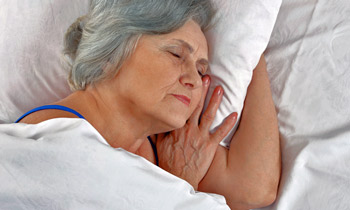Why We Need Good Sleep
Occasional sleep disruptions are inevitable for most people, but ongoing poor sleep, categorized as insomnia, is a larger concern. Insomnia is the condition of difficulty falling or staying asleep. Stress, medications, physical ailments, alcohol, excessive caffeine consumption, anxiety, or depression can trigger insomnia and poor sleep.
When you wake from a good night’s sleep, you’re rested, invigorated and ready to dive into your day. But after a night of tossing and turning, you may drag through in a fog of forgetfulness and fatigue. Optimally, you need eight hours of restful sleep. Most people get less than six hours, and 75% of us experience sleep challenges at least once a week.
Good sleep matters. Here’s why.
Sleep affects memory, learning, and retention.
When you learn new things, it commits to long-term memory via a sleep process called memory consolidation. If you can’t sleep properly, you could lose everything you learned in a day.
Poor sleep slows metabolism and encourages weight gain
Ongoing sleep problems increase appetite hormones and affect how your body processes and stores food. Insomnia can lead to weight gain and hormone imbalance.
Well-rested people are safer and make better decisions
Not enough rest causes “sleep debt.” That triggers fatigue and can take many nights of good sleep to resolve. It slows response times, can cause accidents in the car and at work, and it can also cause poor decisions.
Lack of sleep aggravates medical conditions
When you get good sleep, your body rests, heals, and recovers. Chronic insomnia can cause high blood pressure, irregular heartbeat, and increased stress hormones that can make and keep you sick.
Good sleep supports emotional well-being
Restful sleep lets your brain drain toxins and heal. Sleep deficiency alters brain activity in unhealthy ways. Sleep deprived people may be emotionally out of control, depressed, or engage in risky behavior.
Poor sleep increases diabetes risk
Restful sleep encourages your body to produce and react appropriately to insulin, the hormone that regulates blood sugar levels. Insomniacs often have higher blood sugar levels, increasing diabetes risk.
Proper sleep maximizes performance and productivity
When you get a full night’s rest, you perform better at work and fitness activities and are more productive. Athletes that sleep longer run faster, have better reaction times, and more accuracy.
Sleep deprivation can cause microsleep
Several nights in a row of sleep deprivation of an hour or two can lead to an anomaly called microsleep – when you fall asleep for brief moments during waking hours which can pose safety risks.
Good sleep can lead to a better sex life
A recent study found that even one extra hour of sleep per night can boost the odds of next-day sex by nearly 15%. Even better, women that sleep longer each night found sex more satisfying.
How can you get better sleep naturally?
Good sleep is a habit that you can build and encourage. Like eating well and exercising, it’s a mindful practice to do the right thing for your body and mind. Here are six ways to find consistently more restful sleep without resorting to prescription medication or other unhealthy behavior.
Attune to your body’s natural sleep cycle – Circadian rhythms help us know when to sleep and wake. Listen to your body’s clock and fine tune it for better sleep.
Stick to a set sleep schedule – Waking and going to bed at the same time every day trains your body to sleep appropriately.
Avoid naps and sleeping-in – When you nap during the day, you set yourself up to stay up too late that night. The same thing goes for sleeping in – it pushes back your bedtime!
Ditch the devices at night – A couple of hours before you want to sleep, turn off all blue-screen devices like your phone, TV, and tablet. Read a paper book to unwind instead.
Regulate sleep through light – Total darkness can trigger faster sleep and optimal rest. Sun or other bright light in the morning triggers wakefulness.
Moderation before bed – Don’t snack, drink too much water, drink alcohol or caffeine, or exercise right before bedtime. These may cause sleep disruption or delayed sleep.
Reiki encourages better sleep
Reiki can address some of the underlying causes of insomnia, particularly anxiety, stress, or depression. Even if other factors are driving your insomnia, using Reiki to restore balance can be beneficial for sleep.
Reiki corrects imbalances – by channeling away the energy from stressful encounters during your day, you’re balanced and free to sleep without reliving these moments.
Reiki helps you release – by releasing negative encounters, nagging thoughts, and feelings of anxiety, inadequacy, or worries about tomorrow, you can find peaceful rest.
Reiki restores control – by empowering you to take control of the factors causing your insomnia, you regain a sense of self, knowing you can decide what you let affect you.

